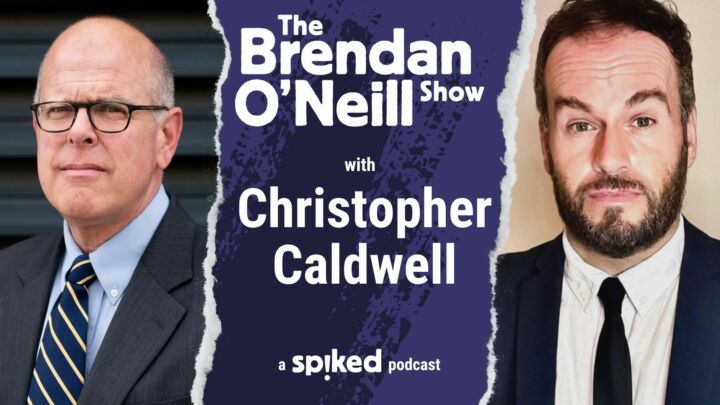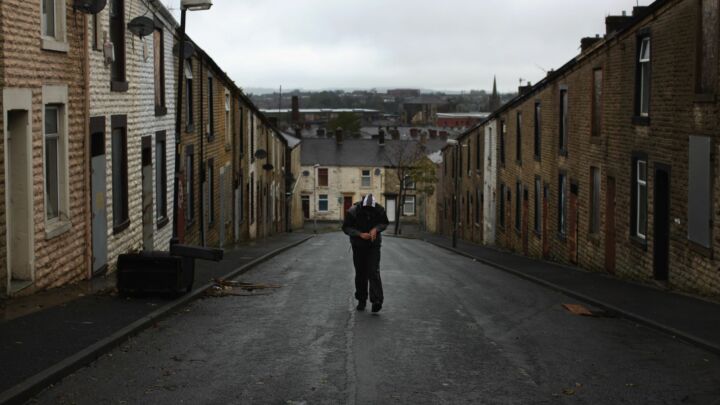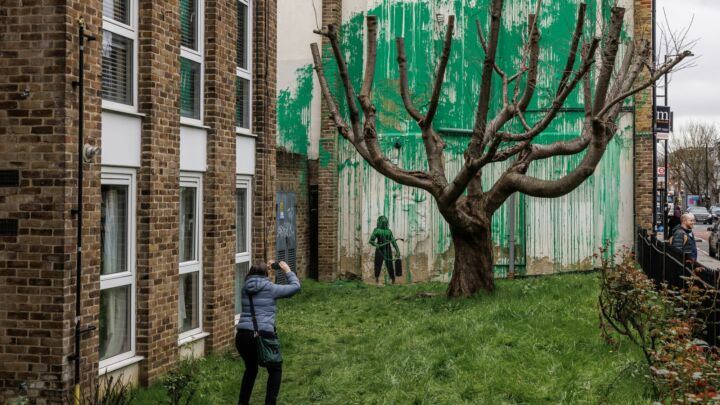Why Alan Partridge still speaks to us
Big Beacon perfectly captures the tragicomic essence of the hapless broadcaster.

Steve Coogan’s grotesque creation, television presenter Alan Partridge, was a quintessential by-product of the 1990s. He came to prominence in a decade when all things postmodern were very much in vogue, when it was the fashion to mix up reality and fiction, jumble the real and the represented, conflate the authentic and counterfeit.
Partridge was the sports correspondent on the fake BBC Radio 4 current-affairs show, On The Hour. He reprised that position on the fake television news show, The Day Today, on BBC Two. Partridge then presented his own imitation chat show, Knowing Me, Knowing You (at the same time, Coogan’s contemporary, Caroline Aherne, was doing similar with her own creation, Mrs Merton), before he became the subject of two series of I’m Alan Partridge.
It was only logical that in the new millennium, Alan Partridge would continue in the same vein by ‘writing’ two fictitious autobiographies, I, Partridge (2011) and Nomad (2016). Some years later, and now three decades after his creation was born, ‘Alan Partridge’ has unleashed his third set of memoirs, Big Beacon, ‘ghostwritten’ by Neil Gibbons, Rob Gibbons and Coogan.
The latest instalment employs a ‘dual narrative’ structure of alternating chapters, one charting Alan’s rise from local radio to the primetime BBC magazine show, This Time, the other narrating his ignominious dismissal from that show and his decision to build a new life on the Kent coast, where he attempts to rebuild an old, dilapidated lighthouse and rebuild his life.
Big Beacon brings back all the tropes that Partridge aficionados will be familiar with. Alan’s plan to renovate a lighthouse to draw the attention of TV commissioners is a typically aimless, half-thought-out venture. And the hapless character remains much the same as he has always been: petty, vindictive, pedantic, lonely, deluded, self-destructive, and utterly lacking in social graces, self-awareness or an internal filter.
His prose and turns of phrase are reassuringly awful. ‘The sniggerers may dismiss lighthouses as little more than architectural phalli, but these admittedly cock-shaped structures are so much more than that’, he writes. ‘They are lasting relics of a time when people would look out for their fellow men.’ Fans will be pleased to read that he is still correcting himself in footnotes for misusing the word ‘literally’ (‘Although not literally’), and he is still engaging in internal monologues about the pedestrianisation of Norwich city centre.
Alan is given to employing tenuous similes, which was also a feature of his previous two memoirs. ‘Thoughts tumbled around my head like trainers in a washing machine’, we read. ‘I was haemorrhaging support like a cheap bag haemorrhages tins of food when the bottom bursts open.’ Or, in a more surreal fashion: ‘The men leap off the stricken boat, their legs doing a running action in mid-air like the Isle of Man logo.’
Alan, in his original incarnation, was a cross between David Coleman, the TV sportsman with the natty sweaters, and Jeremy Clarkson, the car enthusiast given to hyperbole and issuing verbal ‘bombshells’. But in Big Beacon, Coogan and his co-authors seem to draw more from a third real-life source: Richard Madeley, a veteran TV presenter not blessed with the gift of subtlety (read Madeley’s Agony Uncle column in the Telegraph magazine and behold the stylistic parallels with Partridge). While Madeley doesn’t quite have Alan’s weakness for exclamation marks, both adopt a similarly chummy, anachronistic prose. Partridge describes people as ‘quietly sagacious’ or ‘daft buggers’. Some things, he writes, ‘just ain’t gonna happen’.
In Big Beacon, we track Alan’s attempts to start his life again (not for the first time). His spur is the death of his dog, Seldom, at a fairground. This is followed by his serendipitous discovery of the Kent lighthouse, its purchase and refurbishment. We also learn of Alan’s forlorn meetings with BBC bigwigs and his encounters with minor celebrities, such as Esther McVey MP, Dermot O’Leary and Gary Barlow, and his falling in love with a flame-haired, mystery girl called Red. Their love life is described in all its beautiful banality: ‘I peruse her all over, taking in every detail, like an auditor doing a stock take in a warehouse, or a judge at Crufts.’
There are some nicely crafted bits of prose that really encapsulate the tragicomic essence of Partridge, such as his description of the letters in his postbag. ‘They tended to be a roughly equal split between kind letters from elderly women, autograph requests and death threats.’
There are some genuinely laugh-out-loud moments, too, not least when Patridge’s blunt profanities catch you off-guard. He writes of ‘King Cunt trying to hold back the tide’. And he ruminates of yet another calamitous meeting: ‘Well, that went badly, I think. Stupid fucking bastards. Rude rude people.’ Most gloriously, and most Partridge of all, he boasts: ‘My financial health isn’t just rude, it’s positively pornographic.’
For a memoir that traverses the 2010s, Brexit was naturally going to make an appearance. And Alan, being the Guardian-hating, small-minded cretin who detested and resented London long before Nigel Farage made it his rallying cry, is of course on the side of Leave. ‘Surely to believe in something – Brexit aside – you need compelling evidence’, he says. Big Beacon may have three authors but here one feels the unmistakable hand of Steve Coogan himself.
Yet this fails to mar the book, not least because some of Alan’s observations ring too true to life to be read merely as satire. Alan remarks of ‘TV executives back in London… frantically trying to ensure gender parity on the panel of Question Time, asking male presenters to take pay cuts’. Whether the authors intend it or not, this is a fairly straightforward description of the hyper-tokenism that is rife in the television industry today. Alan also chastises a guest for wearing a Remembrance poppy in September, ‘which I considered sarcastically early. I told her this was cynical and instructed her to take it off.’ Again, that could be read as straight journalism.
Then towards the end, as Alan is hospitalised: ‘Nothing against the NHS, but the Spire private hospital in Norwich is a terrific place to be poorly… a call button nurses don’t pretend they didn’t hear, and a snack trolley at 11am and 3pm, just some of the reasons it really is a cut above.’ Even if the authors expect us to scorn Alan’s refusal to worship ‘Our NHS’, most readers will probably just agree with him.
Big Beacon may not be first-class Partridge, or classic Partridge, or even liquid Partridge. But it’s an unpredictable and surprisingly nuanced read. The authors obviously have talent.
Patrick West is a spiked columnist.
Big Beacon: A Lighthouse Rebuilt, A Broadcaster Reborn, by Alan Partridge, with Neil Gibbons, Rob Gibbons and Steve Coogan, is published by Seven Dials.
Picture by: Getty.
To enquire about republishing spiked’s content, a right to reply or to request a correction, please contact the managing editor, Viv Regan.







Comments
Want to join the conversation?
Only spiked supporters and patrons, who donate regularly to us, can comment on our articles.